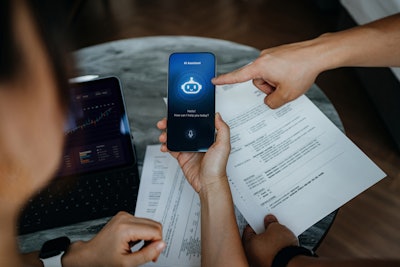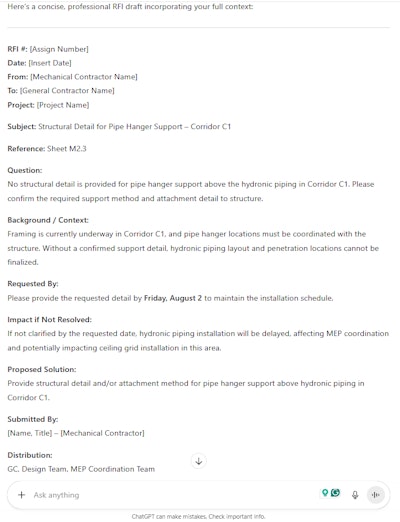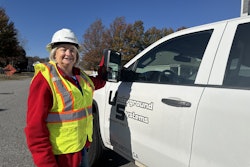
In construction, the stakes are high, and the margins are low. The bulk of your competitive advantage comes from estimating, planning, scheduling and continuous improvement.
And according to Eric Anderton, these repetitive administrative tasks are exactly where AI excels.
The owner of the leadership consulting firm Construction Genius says AI is no longer optional for construction businesses; it’s mandatory. “The question isn’t whether this transformation is coming to construction. The question is, are you going to lead it or get left behind?”
There are many ways that construction contractors can start using ChatGPT to save at least 5 hours per week and thousands of dollars per year, he says.
A few examples from his recent webinar include:
- Knowledge and skills transfer
- Meeting summaries
- Creating RFIs
- Pre-mortem risk checklists
In his examples, Anderton used ChatGPT, but these same principles and prompts could be applied to Gemini, Copilot and other large language models. Several methods in the ChatGPT examples given require a paid Teams or Pro version, which allows users to upload files and, most importantly, protect their proprietary data.
“If you buy the ChatGPT Team version or the Pro version, you can protect your data on a similar basis as you would with Google email and with Microsoft,” he says. “They don't store your conversations. They don't use your data for training. You can use real names, real project details and real sensitive information.”
[Related Content: Benetics Launches First Voice AI App for Construction Crews]
How to Get Started Using AI in Your Construction Business
Anderton urged contractors to start small to build confidence in the tasks that AI can perform for their business, like RFIs, meeting notes, safety reports and email follow-ups.
“You want to begin with low-risk experiments that have high learning potential, and what you want to be able to do with this is key. You want to balance human intellect versus AI assistance. So, you must learn when to trust AI and when to override it. As AI handles more routine work, human judgment and relationships become more valuable, not less valuable.”
The key to getting started with ChatGPT for your construction business is understanding how to write good prompts.
“Garbage in, garbage out,” says Anderton. “Always remember, ChatGPT is a companion. The quality of the information you put in and the context that you give it very much drives the quality of the response that you get."
[Related Content: DroneDeploy's Progress AI Delivers Jobsite Reports in Minutes]
ChatGPT Prompts for Construction Tasks
Here are a few AI prompts Anderton suggests experimenting with today to streamline your operations:
Knowledge Transfer
Need to teach a junior employee how to complete a process, like reviewing subcontractor change orders, but don’t have the time?
Use the following steps to create a video and documented process on how to complete the task, allowing you to save time and scale expertise across the team.
- Download a screen recorder app, such as Loom, onto your desktop.
- Record yourself doing the change order process step-by-step.
- Get a transcription of the recording. (Loom does this automatically, or you can use another transcription service like Otter.AI or Rev.)
- Paste the transcript into ChatGPT and ask it to create a standard operating procedure based on the information provided.
Meeting Summaries
Sharing clear, structured and actionable meeting summaries keeps all project stakeholders on the same page.
Use the following prompts to identify responsible parties, clarify what decisions were made and what tasks remain, capture due dates and time-sensitive issues and record what issues are delaying progress.
Sample Context:
- Go to: ChatGPT → Settings → Custom Instructions
- Fill in these fields:
- What should ChatGPT know about you? “I’m a construction PM. I run weekly coordination meetings, record them, and want summaries with action items, decisions, and outstanding issues.”
- How should ChatGPT respond? “Be clear, structured, and construction-focused. Always include action items, owners, due dates, and open issues. Never guess — only summarize what was said.”
Sample Prompt:
Start a new thread and paste in your project information using the example guidelines below:
PROJECT SETUP
Project Name: Pacific Labs – Downtown San Diego
Meeting Type: Weekly Coordination Meeting
ROLE: You are my construction project meeting assistant. You support the GC team by summarizing weekly transcripts involving the GC, owner’s rep, subcontractors (electrical, mechanical, sprinkler), and field team.
Project Context:
- Lab fit-out with critical clean room areas
- Coordination across trades and schedule
When I paste the transcript and say “Go,” summarize the meeting in 3 parts:
- Key Topics Discussed: Group by theme (e.g., Schedule, Coordination, Issues)
- Decisions Made: Include who made the call and what was decided
- Action Items Table:
| Task | Assigned To | Due Date | Blockers/Notes |
|------|--------------|----------|----------------|
- Only base your summary on what was said
- Flag vague or unclear issues as “Needs clarification”
- Be concise and construction-specific
Creating RFIs
Requests for information should be clear, complete and compelling. Using AI to provide the full context up front – including who, what, where, why, when, how and the downstream impact if not resolved – helps save time and money. Using the following prompts to write RFIs makes ChatGPT sound like it’s part of your team and think like a builder, not a chatbot.
Sample Context:
- Go to: ChatGPT → Settings → Custom Instructions
- Fill in these fields:
- What should ChatGPT know about you? “I work in commercial construction. I write and respond to RFIs, daily logs, and coordinate between field crews, GCs, and design teams.”
- How should ChatGPT respond? “Be concise and professional. Follow construction standards. Never include confidential info unless I provide it. Help me capture full context — who, what, where, why, when, how, and so what.”
Sample Prompt:
Help me write an RFI from a subcontractor to the general contractor. Include full context: who, what, where, why, when, how, and the impact if unresolved.
- Who: Mechanical contractor submitting to GC
- What: No structural detail is shown for pipe hanger support above hydronic piping
- Where: Corridor C1, Sheet M2.3
- Why: Framing is underway, and hangers must be coordinated with structure
- When: Need response by Friday, August 2 to stay on install schedule
- How: Can’t proceed with pipe layout or penetrations until support method is confirmed
- So what: Delay will affect MEP coordination and could impact ceiling grid installation
Keep the tone professional, clear, and specific to the field.
Sample Response: Below is an example of what this prompt produced when we tested it. Note: We used the free version and did not upload any supporting documents.

Now that the framework has been set, you can create a pinned ChatGPT thread called “RFI Generator” to use again, using shorter prompts the next time like: “Missing feeder size for Panel LP-1 — Sheet E1.2 — need by Friday to release wire order.” ChatGPT will continue to get faster and learn from your inputs.
Pre-Mortem Risk Checklist Generator
Before bidding a new project, have ChatGPT analyze where your past projects failed to and turn risk management into a repeatable process. Using the following prompts will help you understand what went wrong, potential repeat risks, what to ask now for better due diligence and what margin killers are lurking in the background.
Sample Context:
- Go to: ChatGPT → Settings → Custom Instructions
- Fill in these fields:
- What should ChatGPT know about you? “I lead construction pursuits. I want ChatGPT to help me run pre-bid premortems using past failures and new project documents.”
- How should ChatGPT respond? “Be specific and strategic. Focus on real-world construction risk. Help me surface early warnings, ask sharper questions, and avoid profit loss.”
Sample Prompt:
You are a senior construction executive preparing to bid a new medical office building project.
Here’s how a similar past healthcare project failed:
- Change orders exploded from 3% to 12% due to uncoordinated and incomplete drawings.
- The framing subcontractor abandoned the job mid-schedule, causing 5-week delays.
- The owner delayed finish approvals by 6 weeks, which pushed occupancy past the committed date.
Now we’ve received the following RFP for a new job:
[PROJECT TYPE]: Ground-up, 4-story medical office building
[DELIVERY METHOD]: Design-Bid-Build
[OWNER REQUIREMENTS]:
- Weekly finish submittals with multi-layer approval
- 14-month completion with zero float on critical path
- MEP coordination required by GC (design is schematic only)
- Liquidated damages: $5,000/day
[DRAWING NOTES]:
- M1.1: “Duct routing and structure coordination TBD during shop submittals”
- A4.2: Interior finishes marked “Finals Pending Owner Review”
Based on this, generate a premortem checklist that includes:
- Early warning signs to look for during bidding and preconstruction
- Specific questions to ask the owner, architect and internal team
- Risk mitigation strategies to avoid repeating past failures
- Red flags that should prompt teams to reconsider or revise their assumptions
Focus specifically on healthcare/medical projects. Assume confidentiality is not a concern.
Taking the First Step
Beyond these examples, there are countless other ways ChatGPT and other large language models can help you in your business, provided you remain critical of its responses and vigilant in protecting your assets. Anderton stressed that AI is an assistant, not a replacement for your own expertise and judgement.
For contractors interested in experimenting with ChatGPT, he recommends signing up for ChatGPTPlus ($20/month) and trying out one of the prompts above. Don’t delegate its use to IT; get your entire team involved. Hold group sessions to practice building out prompts for specific tasks and developing prompt libraries. As you get comfortable testing the prompts on low-stakes tasks, slowly incorporate them into more workflows.
Anderton closed with a rallying cry for contractors, saying:
“While your competitors are repeating the same margin-killing mistakes, you're building systematic wisdom that travels with every estimate. Each painful project becomes institutional knowledge instead of just an expensive experience. Your pre-con meetings become strategic sessions, instead of just scheduled reviews; risk assessment becomes data-driven, instead of gut feeling.
Over time, you've developed pattern recognition that your competitors simply don't have - you become a learning organization. This is how midsize contractors compete with the big boys, right? Superior risk intelligence.”
Proceed with caution: Even in ChatGPT Teams, you should still take measures to protect sensitive data, including summarizing RFP sections or sensitive discussions in plain English, keeping client names generalized, removing proprietary contract information, specs, drawings or passwords, and not uploading or pasting in proprietary attachments. Use common sense to keep your data and your client’s data private and secure.
Anderton announced the launch of a four-week intensive course, “ChatGPT Mastery for Construction Leaders.” While enrollment for the first session has closed, additional cohorts will be offered in the future. For more details, email [email protected].










